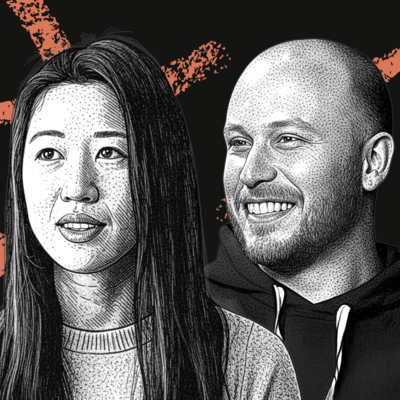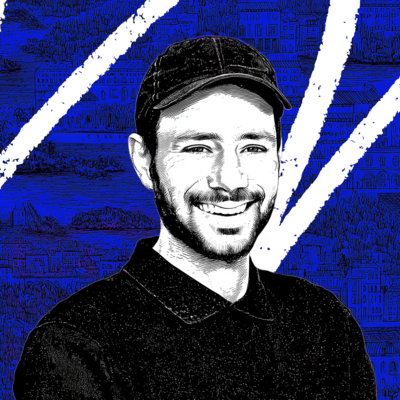
The transcript of AI & I with Alan Lightman is below. Watch on X or YouTube, or listen on Spotify or Apple Podcasts.
Timestamps
- Introduction: 00:01:18
- Science can deepen your sense of the spiritual: 00:02:36
- The nature of consciousness: 00:11:31
- AI might appear to be conscious, but it isn’t: 00:13:11
- Why AI can be considered to be “natural”: 00:19:50
- AI shifts the focus of science from explanations to predictions: 00:30:40
- How modern neural networks simulate thinking: 00:33:48
- Lightman’s vision for how humans and machines will merge: 00:39:38
- Does AI know more about love than you?: 00:43:11
- How technology is accelerating the pace of our lives: 00:49:18
Transcript
Dan Shipper (00:01:18)
Dr. Lightman, welcome to the show.
Alan Lightman (00:01:22)
Thank you for having me on, Dan.
Dan Shipper (00:01:24)
Thanks for being here. So for people who don't know, you are a physicist and a writer. You’re one of the first people at MIT to hold a joint faculty position in both science and the humanities, which I think is amazing. You're the author of Einstein's Dreams, which I think is an incredible book, and most recently the book The Miraculous and the Material. So thanks for coming on.
Alan Lightman (00:01:45)
Thanks for having me.
Dan Shipper (00:01:47)
The thing I like about The Miraculous and the Material is it reads to me almost like a devotional, but for people who feel awe from science. So each chapter is a little story about the atmosphere or atoms or bubbles—and it's an alphabetical order and it almost feels like something I could read every day just to think a little bit about how the world works and then feel a little bit of awe or wonder. Tell me about that.
Alan Lightman (00:02:16)
Well, I wanna make a very slight editorial correction. The title of the book is The Miraculous from the Material.
Dan Shipper (00:02:22)
Ah, what did I say? The Miraculous from the Material. I apologize. An important distinction.
Alan Lightman (00:02:33)
No apologies needed. That's an important distinction because the point of the book is that even though we may understand the material basis for a lot of extraordinary natural phenomena like spiderwebs and volcanoes and so on, that doesn't make them any less awe-inspiring.
Dan Shipper (00:02:53)
It feels like a little bit of a counterpoint to that Walt Whitman poem, “… the learn'd astronomer.” Yes. Are you familiar with that poem?
Alan Lightman (00:03:05)
Yes.
Dan Shipper (00:03:07)
How do you respond to Whitman? If he was here, what would you say to him?
Alan Lightman (00:03:12)
Well, yes, I do know about that poem. I love that poem. For your listeners who don't know, it's about a person who listens to a lecture on astronomy and goes out on a dark night and looks up at the sky and is just overwhelmed by the beauty of the sky. And the message of that poem, I think, is that explanations of phenomena don't really replace the actual experience of phenomena. And sometimes take away from it, I think.
Dan Shipper (00:03:42)
And sometimes take away from it, drain it of its enchantment, right?
Alan Lightman (00:03:50)
Yeah. There's a slight negativity there, and I don't have that point of view. I think when you have a scientific explanation of a phenomena, it actually enhances your appreciation of the phenomenon. And for me, having an explanation of spiderwebs or volcanoes or lightning or the rings of Saturn doesn't diminish when I get my awe and appreciation and admiration of those phenomena.
Dan Shipper (00:04:24)
I think one of the ways to restate that, which I'm curious about how you feel, is: Since enlightenment, as we have more explanations for things we like a lot of— There's a sort of this common refrain that we've disenchanted the world, right? And when we look at the Sun or whatever, you can just say it's just a collection of gases. It's not a God. And when you have the explanation, it just drains everything else out of it. And the explanation is just this inert dead thing that people are like, well, that's all it is. So everything is meaningless. So how do you reframe an explanation in your head? And does it have just the just, or is there something else?
Alan Lightman (00:05:08)
Well, I would just omit the word just. That would be my solution to that dilemma.
Yes, the Sun is a collection of atoms and molecules and it balances gravitational forces inward against thermal pressures outward and all of that. But isn't it amazing? First of all, the Sun and all the stars are amazing spectacles. But isn't it amazing that human beings can understand so much about the cosmos that's far beyond our small planet? And we're never gonna be able to do experiments directly with the Sun or with other stars, but just on the basis of our brains and intellectual power we have, we learn how those things work. We've learned that the universe began 14 billion years ago, which is many, many, many, many, many human lifetimes. We've learned about the vast extent of the universe, which is far beyond our tiny dot of a planet. We’ve learned the molecule that encodes the instructions for making more human beings. And to me, all of these things we've learned, all of this knowledge is a testament to the power of the human brain. It doesn't diminish any of the phenomena and nature, the fact that we understand many of those phenomena.
Dan Shipper (00:06:54)
One of the things that comes out of what you just said, especially going back to omitting the just, is that explanations can exist alongside our own conscious experience of things. You don't have to get rid of your conscious experience because you have the explanation. And they might be mutually enriching. What do you think about the way that viewing reality from those different lenses plays together or should play together?
Alan Lightman (00:07:24)
Well, I think they are mutually enriching. That is the direct experience of the world and a scientific explanation of it. The scientific explanation does not replace direct experience and that's why I call myself a spiritual materialist. The materialist part of that is my scientific side, which understands everything in terms of atoms and molecules and the law of conservation of energy and so on. But I'm also open to and embrace spiritual experiences like feeling part of something larger than myself, or the appreciation of a waterfall or a sunset or a communion with a wild animal, or relationships with people. All of those things are vital and part of what I call spirituality, and I embrace all of that. So I call myself a spiritual materialist.
Dan Shipper (00:08:38)
I think it's a beautiful term and there's a lot to unpack there. The first thing I wanna unpack is just what do you mean by spiritual? Because some of the things you listed, for example, like the beauty of a sunset, or human relationships are not things that people would typically categorize necessarily as spiritual. Maybe the idea of being part of something bigger than yourself, maybe something that you can't explain, but what is spiritual to you vs. not spiritual?
Alan Lightman (00:09:04)
Well, spiritual for me is a list of experiences that I mentioned, feeling part of things larger than myself, the appreciation of beauty, communion with animals and with non-human animals. And that all of that is the experience of awe. That's part of my understanding of spirituality. Now, many people include a belief in God or some divine being as part of their understanding of spirituality. And I think that's perfectly fine. So I think that you can be a spiritual person whether you believe in God or not. And you know, I'm not gonna define God right now unless you asked me to. I think most of us have some understanding of that. So it can either include a belief in God or not. It can include a belief of heaven and hell or not. But I do think that we can have my version of spirituality, whether or not we believe in God.
Dan Shipper (00:10:34)
Is your personal version, I'm assuming because of the word materialist in spiritual materialism, that you don't believe in God?
Alan Lightman (00:10:49)
Well, I'm agnostic on that. If you draw a line with total belief and faith on one end and agnosticism in the middle and atheism on, on the other side, I'm somewhere between an agnostic and an atheist. I'm not an atheist but I'm in that direction. I don't think that our minds and understandings are big enough and broad enough and deep enough to rule out the possibility of God—that is, an intelligent being that created the universe.
Dan Shipper (00:11:30)
That gets me to my next question, which is: One of the interesting implications of materialism is that everything can be explained in terms of basic physical laws, but because, for example, we don't know how consciousness arises from the activities of neurons, that's still kind of an undecided question. So declaring yourself a materialist, while that's undecided, requires a little bit of faith. What do you think about that?
Alan Lightman (00:12:01)
The question of consciousness is a good one because that's one of the outstanding mysteries at the frontiers of science. So my view about consciousness and things like that is that I believe that consciousness, and in fact all mental experiences, are rooted in the material brain that is in the electrical and chemical activity of neurons in the brain, which are material things. So I think that all mental sensations are rooted in that, but we don't yet understand how you get from that material basis to the feeling that we call consciousness. Consciousness is a feeling. It’s a name that we give to a certain sensation caused by 100 billion neurons exchanging chemical and electrical signals, it produces a certain sensation. And we call that consciousness, but it's very hard to know and maybe impossible to know how another organism feels. And that, of course, is related to the question of whether AI can ever be conscious and my view there. Is there any finite list of manifestations of consciousness that you write down, for example, self-awareness and the ability to plan for the future. I think that at some point AI will check all of the boxes of the manifestations of consciousness. But whether that computer is actually conscious is a different question.
Dan Shipper (00:13:54)
I think it sort of plays with one of the themes of a lot of your work, which is there's a limit to how much we can write down or how much we can, explicitly say. And then there's some things that are mysterious and maybe we can feel into some of them, but like even that is maybe, is maybe too much. So you know, anything that we can give a target to, for AI. It can do, but there's actually probably limits to what we can give targets to.
The Only Subscription
You Need to
Stay at the
Edge of AI
The essential toolkit for those shaping the future
"This might be the best value you
can get from an AI subscription."
- Jay S.
Join 100,000+ leaders, builders, and innovators

Email address
Already have an account? Sign in
What is included in a subscription?
Daily insights from AI pioneers + early access to powerful AI tools








Comments
Don't have an account? Sign up!